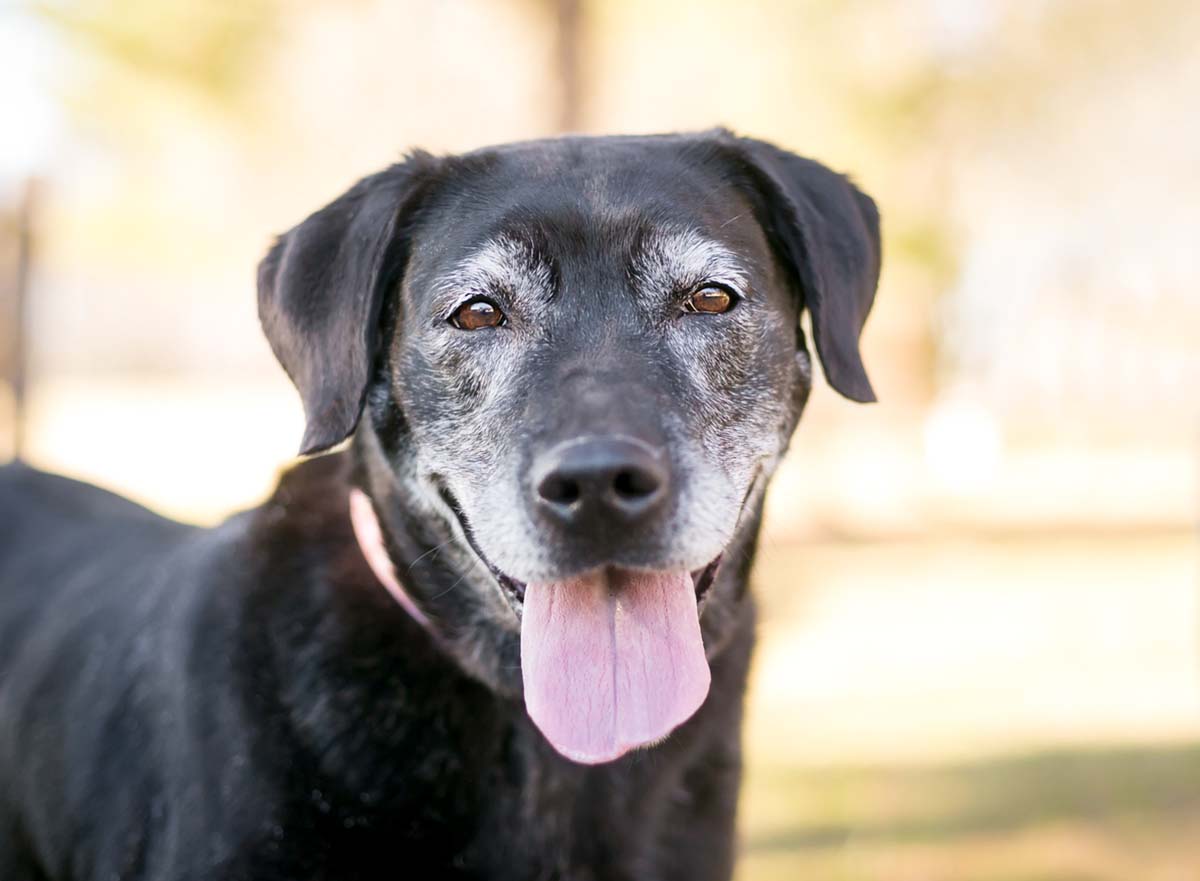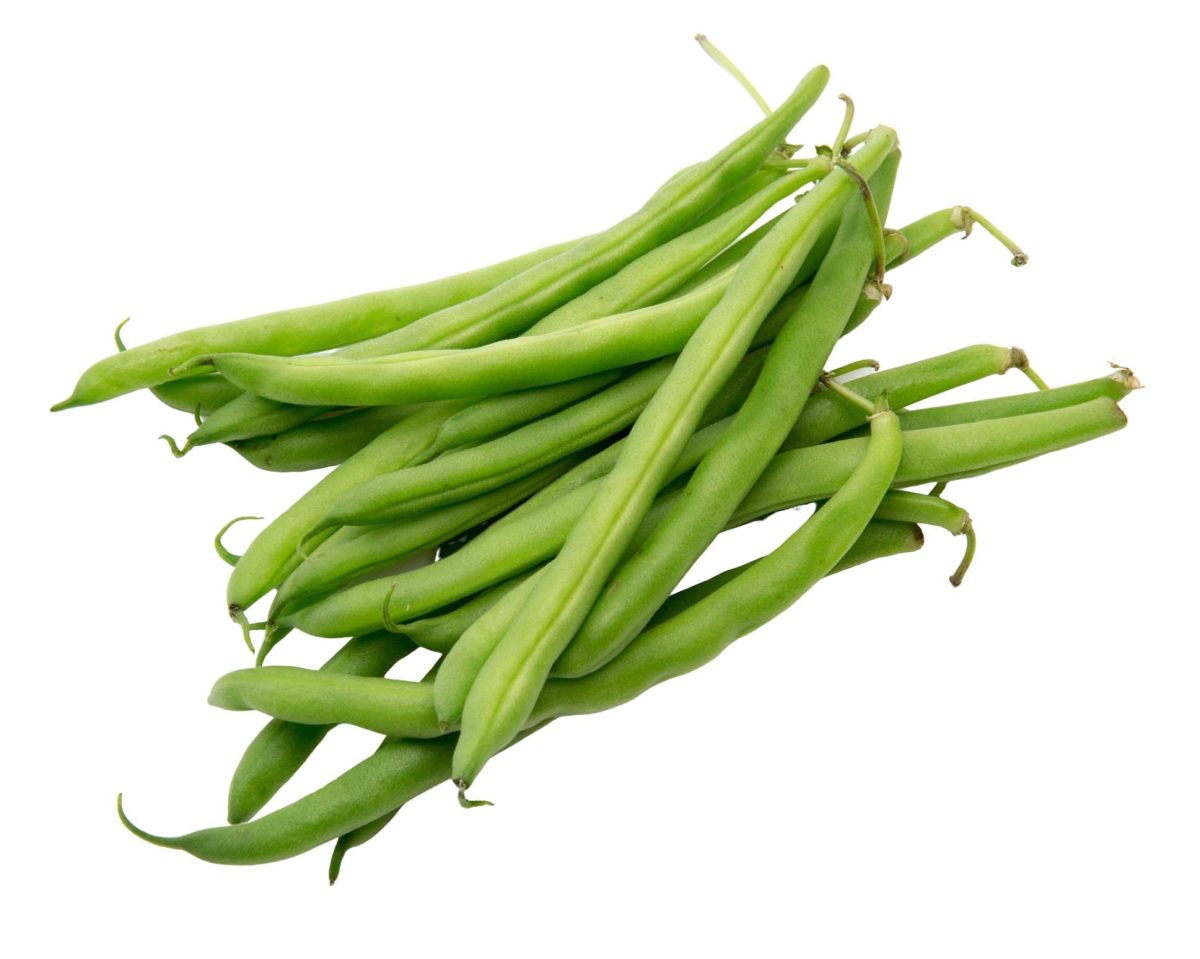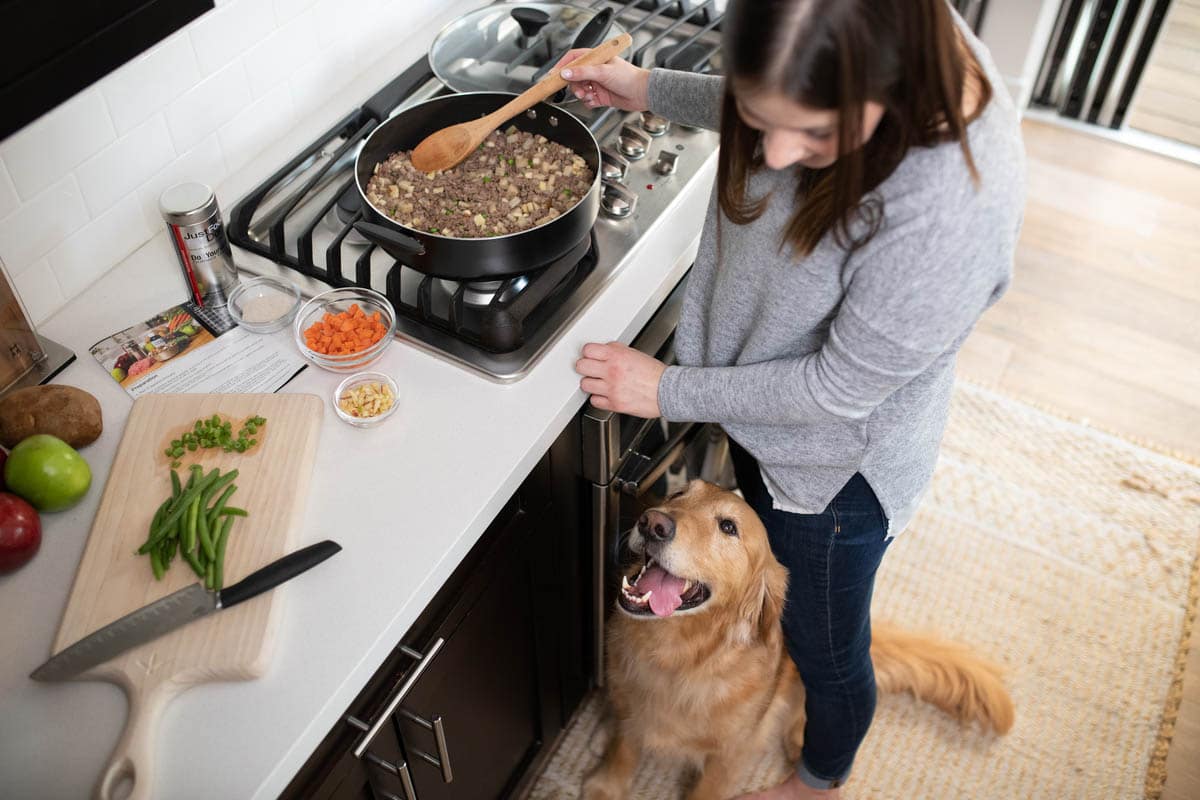When Should You Switch To Senior Dog Food?
Dogs of different life stages have different dietary needs. What should you feed your older dog, and should you switch to senior dog food?
Dogs of different life stages have different dietary needs. Senior dogs don’t have the same nutritional needs as puppies or adolescent dogs, but what should you feed your older dog and should you switch to senior dog food?
At What Age Are Dogs Considered ‘Senior?’

The age when a dog is considered a ‘senior’ isn’t determined by just their age. Some large breed dogs may be considered seniors as young as six or seven years of age. Small breeds of dogs usually aren’t considered seniors until around 11 or 12 years old. Medium dogs, of course, fall somewhere in between.
Signs of Aging in Dogs
No pet owner wants to think about their furry friend aging, but sadly it happens to humans and pets alike. Maintaining your dog’s health as they get older is the best way to guarantee more happy, healthy senior years with your pup.
Signs of aging to look for include:
- Weight loss or weight gain
- Cognitive issues
- Fatigue or increased time sleeping
- Mobility issues
- Changes in vision
- Urinary incontinence
- Changes in behavior
At What Age Should I Switch My Dog To Senior Dog Food?
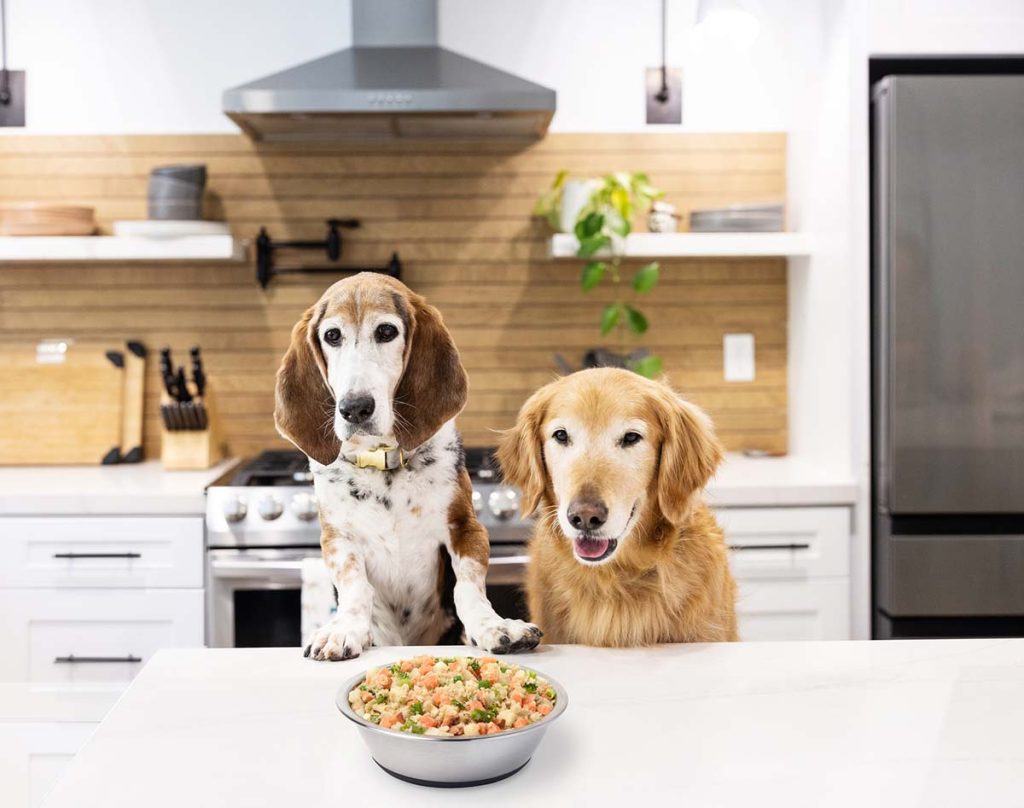
Note that not all dogs actually need to switch to senior food as they age. “There is no true reason to feed a senior diet to our aging dog unless there are noted problems, such as lean body wasting, arthritis or obesity,” says Joseph J. Wakshlag, Ph.D., DVM, professor of clinical nutrition and sports medicine and rehabilitation at Cornell University’s Richard P. Riney Canine Health Center.
Reaching a certain age doesn’t necessarily make your dog a senior, and not all senior dogs have the same dietary needs. Some dogs may require less protein as they age while others need more. Certain dogs may need extra fiber in their diets while others don’t.
Making the right adjustments to your dog’s diet as they get older depends on several factors, including their level of activity, metabolism, body condition, and whether or not they have other health issues. All of these things should be considered along with your dog’s age when deciding on a senior diet.
The Differences Between Senior Dog Food and Regular Dog Food
Adult dog food is formulated to support the health of dogs in their prime. Adult and adolescent dogs are growing and active, and need dog food with the calories and nutrients to support it. Young, physically active dogs need high-protein diets with plenty of fat to burn.
When dogs become seniors, they’re typically less active than they were in their puppy and adult years. This means they’re burning less energy on a regular basis, and don’t require nearly as many calories as puppies or adult dogs. Senior dog food contains less fat and calories, and more ingredients with health benefits for aging pups.
How Does Senior Dog Food Support Dogs’ Health?
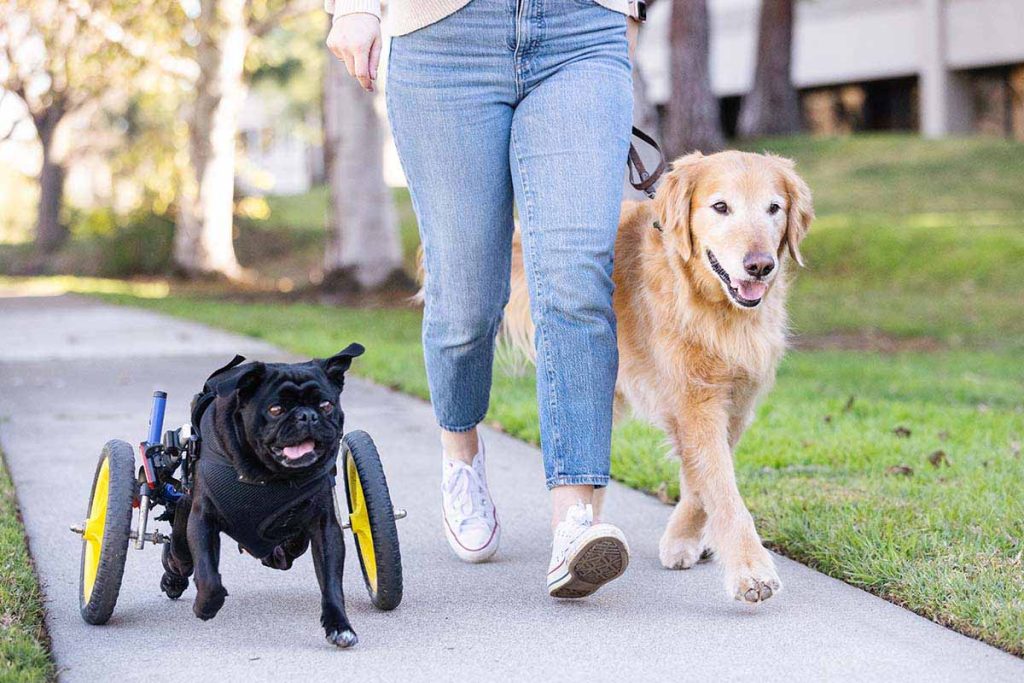
As mentioned, senior dog food is formulated differently than puppy or adult dog food to support the different needs of older dogs. It has fewer calories and a lower fat content than kibble or fresh dog food made for adult dogs. This is to support the decreased activity level most aging dogs experience, and to avoid issues like weight gain and obesity.
Senior food for dogs often contains higher-quality protein sources. Since older dog’s metabolisms are slower, they don’t process protein and other nutrients at the same rate as younger dogs.
Switching To Senior Dog Food
There are a few things you should know if you need to make the switch to a senior diet for your dog. Choosing the best pet food for mature pups will help extend your dog’s life, avoid health problems, and maintain their health for years to come.
What To Feed Older Dogs
All dogs need high-quality nutrition during their different stages of life, and an aging dog needs a few specific things out of their diet. Senior dogs need diets that include a balanced mix of healthy protein, vegetables that are nutrient-rich and low calorie, and contains vitamins, minerals, and supplements to support your pup’s golden years.
For senior dogs, JustFoodforDogs Nutrition Consultants typically recommend the Joint & Skin Support, Venison, and Balanced Remedy recipes. Ask your vet if any of them may be right for your older dog.
What To Look For in Dog Food for Your Senior
While your dog’s dietary needs will vary as they age depending on their size, breed, and overall health, there are certain ingredients dog food should have.
Look for food with the following:
- Antioxidants — Dogs need antioxidants during every stage of life, but making sure senior dogs are getting enough omega-3 fatty acids and omega-6 fatty acids is essential to keep up a healthy immune system, maintain a normal inflammatory response, and support normal heart function. They also help dogs maintain healthy skin and coat. Good sources of these nutrients include fish oil, algae oil, and fish that are good for dogs like salmon and sardines.
- Calcium and Phosphorus — Both considered essential nutrients for senior dogs by the AAFCO, or the Association of American Feed Control Officials, calcium and phosphorus are an important part of any doggy diet. These minerals are needed for healthy bones and teeth and may help prevent kidney disease as dogs age.
- Glucosamine and Chondroitin — As dogs get older, the elasticity in the cartilage around their joints can weaken. Diets with glucosamine and chondroitin may help stimulate cartilage growth in dogs and support joint health. They also help maintain muscle mass for senior pets who may not be as active as they were when they were pups.
- Lower Calorie Content — Senior dogs don’t need high-calorie food because they aren’t burning a high number of calories. Puppies are constantly growing and on-the-go and burn a lot of calories in their early years, which is why puppy food is rich in fat and dense with calories. Once dogs are fully grown and reach senior status, they don’t need nearly as much fat or as many calories.
Changing Your Dog’s Food
It takes careful consideration anytime you switch your dog’s diet to a new food. Making the switch slowly is the best way to adjust your dog to their new diet and avoid possible digestive issues or upset stomach.
When introducing senior dog food, make the switch slowly over at least seven days. Start on day one by mixing a small amount of new food with your dog’s old food, and over the next several days increase the ratio of new to old food. You should be able to make the full switch after about a week.
Can Senior Dogs Eat Puppy Food?
Senior dogs shouldn’t eat puppy food because of the difference in things like fat and calorie content. Puppy food contains even more fat, calories, and protein than regular adult dog food because puppies are growing so much faster in their early years and have a very fast metabolism.
The extra nutrients found in puppy kibble and other dry food for puppies aren’t necessary for senior dogs, since their metabolism and activity levels tend to be much less than those of young dogs.
This content is for informational use only and does not replace professional nutrition and/or medical advice, diagnosis, or treatment. It is not a substitute for and should not be relied upon for specific nutrition and/or medical recommendations. Please talk with your veterinarian about any questions or concerns.
